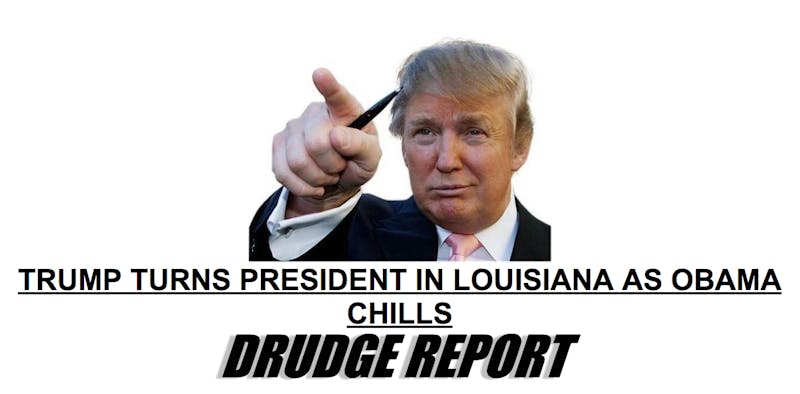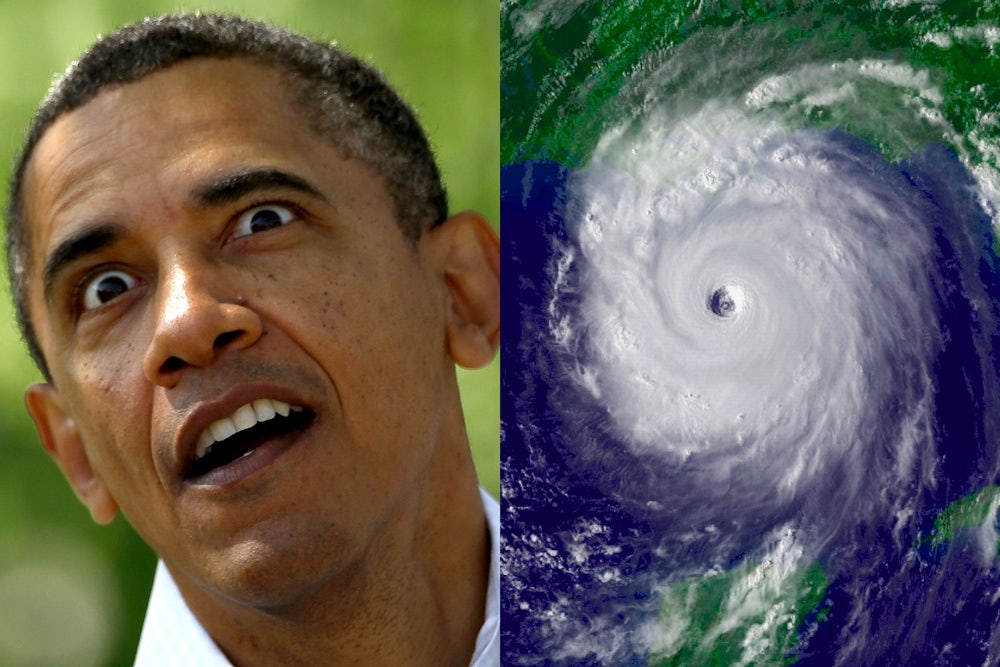As a genre of political spin and analysis, “Obama’s Katrina” has been with us since the beginning of the president’s administration. Anytime something tragic and abrupt happens in the country is an occasion for Republicans and media figures to compare it to President George W. Bush’s famously terrible response to Hurricane Katrina in 2005.
By the Washington Post’s count, there have been 23 Obama’s Katrinas since 2009, and that only brings us through to July 2014. Assuming there have been no additional Obama’s Katrinas in the past two years, cataclysmic flooding in Baton Rouge, Louisiana, last week would make it two dozen.
Media predictably treats Bush and Obama differently on Louisiana disasters https://t.co/QgPOJq77me pic.twitter.com/2jldrfauWw
— Washington Examiner (@dcexaminer) August 19, 2016
.@tperkins: I thought Pres Obama would come to Louisiana in light of all the criticism Pres Bush receivedhttps://t.co/iOi2pB3DSq
— FOX & Friends (@foxandfriends) August 19, 2016

The Obama’s Katrina meme has never stuck, but it will not die. When you consider the fact that some Republicans believe Obama is to blame for the government’s response to actual Katrina, three years before he became president, it seems no altogether unlikely Obama will be held to account for future Katrinas, when Hillary Clinton is running the government.
But there’s a reason the Obama’s Katrina genre endures in futility: The unwholesome mixture of a press corps obsessed with optics and a conservative establishment reeling from its own failures.
Because world events are complex, the historically important ones are often memorialized by their most potent symbols. For George W. Bush, these moments include being informed about the terrorist attacks of September 11, 2001, while reading The Pet Goat to schoolchildren, standing atop a pile of rubble at Ground Zero in New York City later that week, declaring an end to hostilities in Iraq on an aircraft carrier with a “Mission Accomplished” banner slung high in the background, and, crucially for this story, flying over the wreckage of New Orleans in Air Force One, two days after Hurricane Katrina made landfall.
These totems serve useful purposes, but they do not convey anything literal about 9/11, the Iraq war, Katrina, or anything else. And yet many journalists and Bush loyalists (including Bush himself) remember the political consequences of Katrina as fallout from the flyover which made him look “detached and uncaring.”
From that vantage point, Obama seems to be benefiting from a double standard—he hasn’t even bothered to do a flyover!
The optics of this White House statement: “While in Martha’s Vineyard, the President has received updates on the situation in Louisiana...”
— David Gura (@davidgura) August 19, 2016
But from a clearer vantage point, people were actually unhappy with Bush’s handling of Katrina because he was blasé in the face of looming disaster, unprepared when it struck as predicted, and left thousands of people—largely black, struggling with poverty, unloved by their government—to die. The plane had almost nothing to do with it.
Katrina wasn’t Bush’s unique bad luck. Every administration has to grapple with natural disasters, and presidents are judged by the effectiveness of their responses. But the Republican Party is ideologically ill-suited to meet this fixed challenge, and Bush added a layer of corruption on top of that, which compounded an inherent liability.
Moved by the historic toll Hurricane Andrew took on lives and property when it struck Florida in 1992, President Bill Clinton recognized that government failure in the midst of a natural disaster can be both literally and politically deadly. He took steps early in his presidency to shore up the Federal Emergency Management Agency, and equip it to respond effectively to the worst-conceivable disasters. He even made it a cabinet-level office.
When Bush became president, he neglected FEMA before folding it into the Department of Homeland Security, stripping it of its disaster-preparedness function, and appointing a crony to run it.
This, again, wasn’t a circumstantial decision—the kind of mistake you might make by doing too much to prevent a past threat, instead of preparing for a future one. Republicans are ideologically disposed to devolving FEMA like this.
Asked about the agency during a June 2011 Republican primary debate, before he became the GOP’s 2012 presidential nominee, Mitt Romney said, “Every time you have an occasion to take something from the federal government and send it back to the states, that’s the right direction. And if you can go even further, and send it back to the private sector, that’s even better. Instead of thinking, in the federal budget, what we should cut, we should ask the opposite question, what should we keep?”
Two months later, after an earthquake struck Virginia, and with a big hurricane bearing down on the eastern seaboard, House Republicans attempted to establish the precedent that supplemental disaster relief spending must be offset with cuts to discretionary programs that disproportionately help the poor.
If Republicans somehow win the presidency this year, we can be fairly certain how highly they’d prioritize disaster relief, because they’ve told us repeatedly.
Unencumbered ideologically, and unwilling to allow a natural disaster to unravel his presidency, Obama rebuilt FEMA after Bush left office. His agency has been praised everywhere it has been deployed, by Republican and Democratic governors alike.
Obama can thus entrust his FEMA director, Craig Fugate, to respond competently to a situation like the flooding Louisiana, and to not be blindsided by predictable disasters, like hurricanes. Obama didn’t end his Martha’s Vineyard vacation early last week because his emergency manager is working ably to respond to the crisis, and Louisiana’s Democratic governor, John Bel Edwards, said Obama would disrupt disaster relief efforts if he traveled to Louisiana. (Obama is headed to Baton Rouge on Tuesday.)
Unconstrained by such things as how well the federal and Louisiana governments respond to the flooding, Donald Trump decided to capitalize on Obama’s absence for explicitly political reasons. “The spirit of the people is incredible,” Trump said after visiting Louisiana last week, “and, honestly, Obama ought to get off the golf course and get down there.” To the extent personnel is policy, though, we can safely bet that if Trump were president, his non-optics-based response to natural disasters would be horrendous. Clinton, Bush, and Obama proved—in positive and negative ways—that what matters when disaster strikes is a competent administration full of best-in-class appointees, and a president who prioritizes their mission.
Trump, meanwhile, just hired the impresario of Breitbart to run his campaign. He is surrounded by a chaotic coterie of racists and oligarch-worshipping lobbyists who can’t manage their way out of a paper bag. He fired one campaign manager and had another acting campaign manager resign. He can land a plane near the site of a flood, but that’s about the extent of his competence.
Republicans know all this, and reporters should know all of it, too. But campaign reporting is a beat concerned (excessively, in my view) with the effectiveness of political stagecraft.
It is no surprise that when a disaster happens, whether it’s an oil spill in the Gulf of Mexico or flooding in Louisiana, political reporters overemphasize questions like whether Obama looks like he’s responding to the crisis effectively, and underemphasize questions like: Is the response working?
Republicans capitalize on the ensuing bad headlines for the obvious reason that they are Obama’s opposition party. But they are also heavily invested in the idea of manufacturing an “Obama’s Katrina” because they have a rooting interest in neutralizing the long-term brand damage Katrina did to their party.
A similar dynamic and an identical instinct explain why seemingly every political scandal since the 1970s has “-gate” suffixed to its name. Appearance of impropriety, malfeasance, or incompetence is often as important to the people who cover politics as is the substantive question of whether impropriety, malfeasance, or incompetence is actually at hand.
Meanwhile, from the GOP’s perspective, covering others in the stink of their failures is easier than righting those failures.
Republicans could rehabilitate the public image problem they inflicted upon themselves in 2005 by committing to managing bureaucracies effectively and giving federal agencies the resources they need to succeed. But they don’t particularly want to do that; and in any case it’s much easier to pretend that every disaster Obama manages is effectively his latest Katrina.
